<Back to Index>
- President of Czechoslovakia Antonín Novotný, 1904
- President of Czechoslovakia Ludvík Svoboda, 1895
PAGE SPONSOR
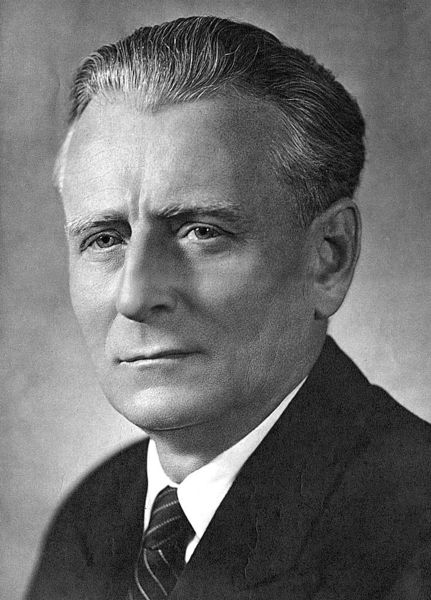
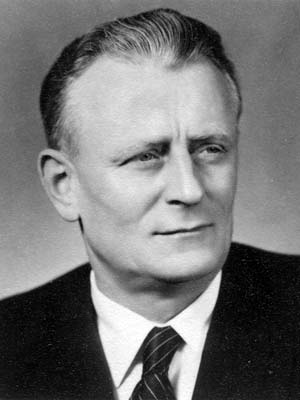
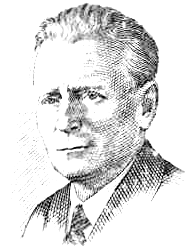
Antonín Novotný (10 December 1904 – 28 January 1975) was General Secretary of the Communist Party of Czechoslovakia from 1953 to 1968, and also held the post of President of Czechoslovakia from 1957 to 1968. He was born in Letňany, now part of Prague.
Antonín Novotný became a member of the Communist party in 1921. He later worked as a delegate to the 7th congress of Comintern (1935). Due to his involvement in the party's underground struggle, he was arrested in 1941 and imprisoned in the Mauthausen concentration camp where he served as Kapo. He was liberated by American troops on 5 May 1945.
After the war, Novotný became an important member of the communist party and was appointed as First Secretary in 1951, but a short time later resigned. However, when Rudolf Slánský was ousted from the post in 1953, Novotný succeeded him and, thus, became the de facto leader of Czechoslovakia when Klement Gottwald died later that year. He was reelected in 1958 and 1964.
While President Antonín Zápotocký and Prime Minister Viliam Široký wanted a less repressive way of governing, Novotný was able to outflank them because he had the backing of the Soviet Union. In late 1953, at a meeting in Moscow, Zápotocký and Široký were told to adhere to the principles of "collective leadership" -- in other words, abandon power to Novotný. After Zápotocký's death in 1957, Novotný succeeded him as president.
In the Czechoslovakia of Novotný, people continued to face strict government regulations in the arts and media, although they had loosened dramatically since Stalin's death in 1953 and the subsequent De-Stalinisation programs of 1956. His quasi - authoritarian practices led to mounting calls for a new form of socialism over the unsatisfactory pace of change that would include the accountability, proper elections, and responsibility of leaders to society. Novotný's administration, however, still remained centralized for 10 years. While he was forced to adopt some reforms in the 1960s, these efforts were half - hearted at best.
But growing public unpopularity caused Novotný to lose his grip on power. He was forced to resign as party leader in January 1968 and was replaced by a reformer, Alexander Dubček. In March 1968, he was ousted as president and in May he resigned from the Central Committee of KSC.
In 1971, during the period of normalization, he was reelected to the Central Committee. However, his political influence was minimal and he was too ill to be a strong force in the more moderate Gustáv Husák administration.
He died on 28 January 1975 in Prague.
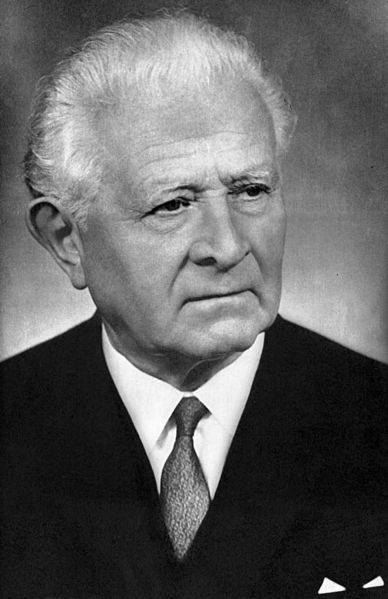
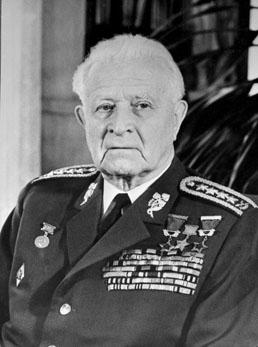
Ludvík Svoboda (25 November 1895, Hroznatín, Moravia – 20 September 1979, Prague) was a Czechoslovak general and politician. He fought in both World Wars, for which he is regarded as a national hero, and was later the president of the Czechoslovak Socialist Republic.
In World War I Svoboda deserted from the Austro - Hungarian army, while on the Eastern Front, and fought for the Czechoslovak Legion in Russia. He took part in the legendary battles of Zborov and Bakhmach and returned home through the famous "Siberian anabasis". He then worked at his father's estate before launching his military career in the Czechoslovak army.
In the early 1930s he taught at a military academy. After the German occupation in the spring of 1939 he became a member of a secret underground organization Obrana národa ("Defense of the nation").
It is supposed that at the same time he established a connection with the
Soviet intelligence. In June 1939 he fled to Poland, forming an initial
Czechoslovak military unit in Kraków, before falling into Soviet captivity during the Soviet invasion of Poland,
however escaping a certain death after - as he related it after the war
- asking his captors to call a phone number in Moscow where they could
obtain a personal information about him; this worked. After the outbreak
of the German offensive against the USSR, Svoboda became head of the Czechoslovak military units on the Eastern front. The unit fought the Germans for the first time in March 1943 near the Battle of Sokolovo in Ukraine. As a commander he also led troops of the 1st Czecholsovak Army Corps in the Battle of the Dukla Pass in
the fall of 1944 when, after a very heavy fighting, this unit managed
to cross the Czechoslovak state border for the first time. Svoboda's
charismatic leadership and personal bravery was highly valued by his
commanding officer at the time, Soviet marshal Ivan Konev. Trusted by Klement Gottwald´s exile leadership and Soviet functionaries, he quickly climbed the military ranks becoming army general in August 1945.
In World War II a substantial part of Czechoslovakia was liberated by the Red Army and the 1st Czecholsovak Army Corps under the leadership of Svoboda. Svoboda was appointed Minister of Defense while being welcomed as a hero of the Eastern Front. The Soviet Union enjoyed a great popularity among the population and in the elections of 1946 the Communist Party of Czechoslovakia won 38% of the vote nationwide.
On 22 February 1948, nearly all of the non - Communist cabinet ministers resigned in protest of the practices of Gottwald and the other Communists. Svoboda was one of the few who remained in office. The Communist dominated Trade Union Congress voted unanimously to replace the 12 departed ministers with Communists. As armed workers and the People's Militias took to the streets, Svoboda refused to quell the insurrection with military force, saying "the army will not march against the people". Two days later (and one day after a general strike in which 2.5 million citizens participated), President Edvard Beneš gave in to growing pressure from Gottwald and appointed a government dominated by Communists and pro - Soviet Social Democrats. The takeover was completely bloodless. Svoboda, whose label had been that of an "apolitical" minister since the first days of his term, then joined the Communist Party whose de facto Trojan horse he had been all the time and was elected a deputy to the National Assembly.
Svoboda was forced out of the army (in which he had reached the rank of General November 1945) in 1950 under pressure from Stalin. He was named deputy Prime Minister from 1950 to 1951. In the purges which followed, Svoboda was imprisoned and "recommended" to save his image by committing suicide, but eventually released and stripped of all offices. His return to public life took place upon a personal wish of Khrushchev, whom Svoboda had met during the war, and he subsequently headed the Klement Gottwald Military Academy.
In 1946 he was awarded the title People's Hero of Yugoslavia, in November 1965. Svoboda was also awarded the title Hero of the Soviet Union (on 24 November 1965), and Hero of the Czechoslovak Socialist Republic (being awarded the latter title again in 1970 and 1975). He was awarded the Lenin Peace Prize (1970).
After the ending of the Antonín Novotný regime, in the period known as the Prague Spring, Svoboda was elected President of Czechoslovakia on 30 March 1968, on the recommendation of Alexander Dubček, the First Secretary. He was an acceptable candidate both for Czechs and Slovaks plus, as a war hero and a victim of Stalinist purges, he enjoyed a very high esteem among the population.
Svoboda then gave a mild consent to the reform process of the new Party leadership until the Soviet intervention in August 1968. Horrified at his experiences in two world wars, he signed an order preventing the Czechoslovak Army from getting involved with the invading Warsaw Pact troops. He traveled to Moscow in order to secure the release of the reform leaders, who had been kidnapped by the invading forces. However, when Svoboda arrived, Leonid Brezhnev demanded that he appoint a "peasant - workers´government" in order to give credence to the planned official line - -that hardliners in the KSČ had themselves requested the invasion. Svoboda not only refused, but threatened to put a bullet into his head in the presence of Brezhnev unless Dubček and the other reformists were released.
Nevertheless, Svoboda could do nothing to prevent Brezhnev from forcing the Czechoslovak representatives to sign the notorious Moscow protocols, which
meant a factual capitulation as they were kept secret and provided the
Warsaw Pact armies with a factual license to a "temporary stay" (as it
was called later at an October parliamentary session) in Czechoslovakia.
The protocols also obliged the Party leadership to promote political,
cultural and other changes to stop the reform process. Svoboda also
supported then Minister of Defense Martin Dzúr, who ordered the
Czechoslovak army to not show any resistance. Given the public outrage
and resistance, Svoboda's arbitrary action was in fact in accord with
Brezhnev's intent.
Svoboda survived the removal of reformist Communists in Czechoslovakia while passively witnessing the Party purges and suffocation of former civic liberties. He even helped silence the disobedient press and also contributed to Dubček's ouster from his post in April 1969. Always he continued to believe, and maintain, that his submissive conduct helped save thousands of lives from "immense consequences"; and he defended this policy by invoking his own memories of the horrors of war.
After resisting stubbornly the attempts of Gustav Husák´s new leadership to oust him from the presidential office, Svoboda had to be forced to retire in 1975 through a constitutional act (paragraph 64 Nr.143/1968 Sb.). This act stated that the Federal Assembly had the right to elect a new president, provided that the existing one was, for a year or more, unable to carry out his official duties. In Svoboda's case, his ill health made the act relevant.
Despite being misused by politicians for their goals several times, Svoboda still enjoys a high credit among the Czechoslovak population, probably due to his brave stance and fortitude on several occasions during crucial moments of the Czechoslovak history; and squares and streets in both the Czech and Slovak Republic continue to bear his name, while those of other communist leaders were removed after the Velvet Revolution. His attitude can be perhaps explained by his own words: All I have ever done must be measured by my intention to serve best my people and my country.